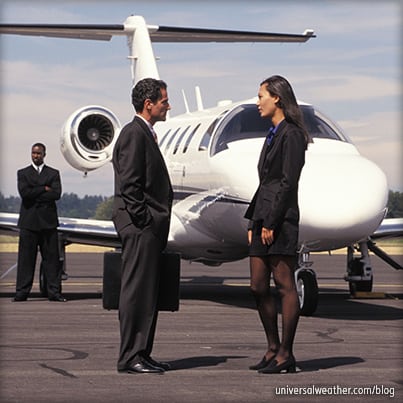Security Planning for Business Aviation Travel – Part 1: Pre-Planning

This business aviation blog post is part of a series on security briefings for your trip.
To reduce risk and improve the success of your international trips, it is recommended for business aircraft operators to order security intelligence reports for international destinations they’ve not been to before or have not visited in more than 60 days. There are different types of reports, such as airport, city, and hotel intelligence reports. Each has its own importance as part of your pre-trip security planning process.
The following is an overview of what you need to know about security planning for your next trip and the different types of reports you should consider:
1. Airports are usually more secure than local areas
For the most part, airports are secure worldwide, and later, in Part 2 of this series, we’ll go more in depth into airport security. In general, security issues are more likely to be a factor off-airport – in the city, local area, or hotel you’re visiting. An example is Cape Town (FACT), where usually there are no airport security issues, but there may be security issues off-airport – especially for women traveling in the city. Security in Cape Town and elsewhere in the international environment depends on culture, local events, and whether you’re traveling during the day or at night. City, local area, and airport security intelligence reports provide recommendations on how to mitigate destination risks.
2. Airport security intelligence reports
Airport security reports cover airside considerations including: aircraft parking areas, security checkpoints, airside access procedures, airport patrols, and video surveillance. Airport briefs should be obtained at least once for each destination you operate to. Barring a change of government, or local regulations, the details of an airport security report do not usually change quickly, and this information usually remains current for some time.
3. City security intelligence reports
City and local area security reports are geared toward security information, including culture, ethnic groups, religions, and languages, as well as risks associated with driving/staying within the city. City reports include more in-depth information than country briefings and should provide emergency contact information for local embassies, hospitals, and so on. Local area reports should be obtained for each trip, as local conditions/situations can change.
4. Hotel security intelligence reports
There are several good reasons for ordering hotel security briefs, particularly as you’re usually more vulnerable when it comes to staying at hotels and using local transport. These reports include information on hotel conditions – structure, security, fire egress, public access control, video surveillance, crime in and around the hotel, and emergency response time for police, ambulances, etc. For instance, if a hotel also has a popular bar/restaurant that brings in a local crowd, you may not want to stay there for security reasons, and a hotel report will help you identify that. Hotel reports should also provide best routes, road conditions, and alternate routes among the hotel, city, and airport.
5. Security intelligence reports should be obtained more frequently
Business travelers often need to travel to destinations with assorted local security risks. It’s important to know and understand the risks before you go. If you’re traveling to Kiev (UKBB) or Bangkok (VTBS), for example, it’s important to have a comprehensive and current overview of the macro geopolitical situation, as well as the changing local security scenario. You’ll also want to consider requirements for overflight and landing permits and airport slots, as those will affect your ability to leave the country quickly. Always have "Plan B" egress options ready, and know what permissions are needed day of operation in case you need to exit early. Also, an important consideration is planning an alternate airport in the event you encounter a mechanical issue or some other unforeseen operational/security issue.
6. Security intelligence briefs
Intelligence briefs provide security highlights and security detail to help operators mitigate risks, both in trip planning and day of operation. It’s recommended to obtain security briefs at least three weeks in advance. Ensure that your security contractor provides updates closer to day of operation – as this may impact your decision to travel to a particular destination.
7. Security pricing and cost estimates
Pricing for aircraft security and personnel availability differs by location and country and depends on large local events that may be taking place. During major event periods – such as large sporting events, economic forums, and film festivals – security pricing often increases from standard costs. It’s best to make security arrangements well in advance, particularly during major events, in order to obtain best pricing. Advanced cost estimates can be obtained by your 3rd-party provider. However, it’s important to ensure that all of your security expectations have been communicated clearly so that security providers can put together reliable estimates. If cost of an aircraft security guard is too high, consider using tamper tape – with coded numbers to ensure someone does not move or replace it – on all doors and hatches. Such services will prevent aircraft from being broken into or tampered with while parked on the ramp.
Conclusion
Security is an investment, and it’s important to obtain security services from reputable companies. Over recent years general aviation security risks have increased, and there have been cases of aircraft being tampered with and broken into. Investing in security planning/arrangements can be an important consideration in terms of reducing likelihood of aircraft damage and/or risk to company personnel.
Questions?
If you have any questions about this article or would like assistance in planning security for your next trip, contact me at traciecarwile@univ-wea.com.
Stay tuned for Part 2, which covers operational details for your security planning.



